On 26 February 2024, Cameroon's Prime Minister, Joseph Dion Ngute, signed a decree "laying down the terms and conditions for the management of water used for agricultural purposes and the maintenance of hydraulic infrastructure in Cameroon's irrigated areas". The regulatory act lays down new conditions for the exploitation and use of underground and surface water resources in this Central African country, which is struggling with water shortages.
And there you have it! The exploitation and use of water in agricultural areas in Cameroon will no longer be anarchic. Decree No. 2024/00176/PM of 26 February 2024, “laying down the conditions for the management of water used for agricultural purposes and for the maintenance of hydraulic infrastructures in irrigated areas in Cameroon”, will help to control these practices in the Central African country. “From now on, water will only be drawn from identified mobilisation points and in accordance with the thresholds authorised by the legislation in force and the international conventions ratified by Cameroon. The use of water in irrigated areas is exclusively for agricultural purposes”, reads Article 7 of the four-page, 14-article decree.
In Article 8 of the decree, Cameroon’s Prime Minister Joseph Dion Ngute specifies that before the start of each agricultural season, the public entity must define, on the basis of hydrometeorological data, the quantities of water to be drawn by users who are co-contractors of the public entity from water mobilisation points in accordance with duly ratified conventions and the legislation in force. The Cameroonian authorities will also ensure compliance with the defined abstraction quantities, once the authorisations have been granted by the Cameroonian Ministry of Water and Energy, for a renewable period of five years.
Promoting fair and sustainable management of irrigation water
As a reminder, any abstraction of surface or groundwater for industrial or commercial purposes is subject to the payment of a fee, the rate, basis and method of collection of which are set by the Finance Act.
The rates are as follows: 50,000 CFA francs (76.22 euros) for withdrawals of less than 100 m³ of water per day, 200,000 CFA francs (nearly 30.5 euros) for withdrawals of between 100 and 500 m³ of water per day, 300,000 CFA francs (457.3 euros) for withdrawals of between 500 and 1,000 m³ of water per day, and 500,000 CFA francs (more than 762 euros) for withdrawals of more than 1,000 m³ of water per day. These terms and conditions are set out in Decree No. 2001/164/PM of 08 May 2001 specifying “the terms and conditions for the abstraction of surface water or groundwater for industrial or commercial purposes”.
Irrigation and drainage of agricultural waste water must be carried out in accordance with the technical protocol set out in the Code de gestion des périmètres, for which those in charge of agricultural perimeters will be responsible. In addition, penalties will be imposed for failure to comply with the specifications or for behaviour that compromises the operation of agricultural areas or the long-term viability of the infrastructure.
Read Also – CAMEROON: In the North, 11,000 hectares of land will be irrigated from the Benue
In addition to rationalising water use, these new regulations aim to ensure equitable management of the resource for farmers, given the disparities in access to irrigation water, to preserve water intended for consumption, and to reduce food insecurity.
Inès Magoum







